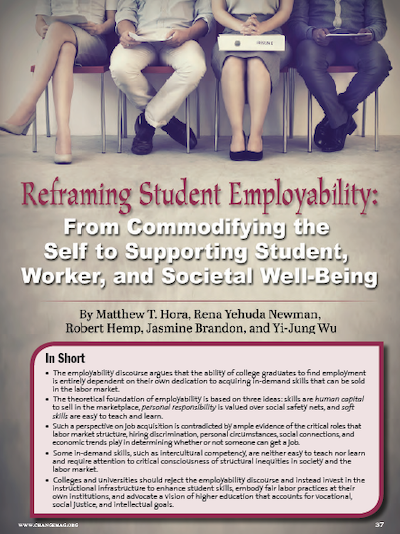UW-Madison’s Matt Hora collaborated with students Rena Yehuda Newman, Robert Hemp, Jasmine Brandon, and Yi-Jung Wu to write and publish a paper titled “Reframing student employability: From commodifying the self to supporting the student, worker, and societal well-being.”
Hora is a research scientist with the School of Education’s Wisconsin Center for Education Research and the director of the Center for College-Workforce Transitions. Additionally, he is an assistant professor of adult and higher education in the Department of Liberal Arts and Applied Studies.
 Newman and Hemp are both undergraduate students, while Brandon and Wu are graduate students. Brandon is pursuing a master’s degree with the School of Education’s Department of Curriculum and Instruction, and Wu is a Ph.D. student in the School’s Department of Educational Leadership and Policy Analysis.
Newman and Hemp are both undergraduate students, while Brandon and Wu are graduate students. Brandon is pursuing a master’s degree with the School of Education’s Department of Curriculum and Instruction, and Wu is a Ph.D. student in the School’s Department of Educational Leadership and Policy Analysis.
The paper was published in the journal Change: The Magazine of Higher Learning. The report centers on two questions: How can colleges and universities cultivate employability in their students? And how can institutions measure and prove their students’ employability to policymakers and taxpayers?
Looking towards countries like Australia and England, the authors examined growing international critiques over simplistic perspectives of employability to address these questions.
Over a 16 week course in the Department of Educational Policy Studies, Hora and his students examined these questions in critiques through reading, discussion, and debate. They reviewed different frameworks of employability around the world, took a historical account of theories underlying different constructs, examined how institutions were applying these ideas, and studied the non-cognitive or soft skills that are common in employability discourse.
The authors suggest that current literature on student employability assumes the ability to find employment is dependent on a dedication to acquiring in-demand skills that can be sold in the labor market.
“In particular, the skills discourse draws on three influential ideas: human capital theory, the ideology of personal responsibilities, and a view of ‘soft’ skills as commodities with value in the marketplace,” the paper explains.
However, the accessibility to jobs and the ability to acquire skills is often hindered by factors like hiring discrimination, personal circumstances, and economic trends. The authors also contend that this view of employability privileges the voices and interests of employers over that of students.
They recommend that, instead of relying on current employability discourse, colleges and universities invest in instructional infrastructure to enhance students skills, embody fair labors practices, and advocate a vision of higher education that accounts for vocational, social justice, and intellectual goals.
The authors write: “Given the fact the students are graduating into a world with not only a changing workplace but also one where hiring discrimination persists and racism is normalized by leaders around the world, we argue that fostering critical consciousness in today’s college students, and not just a marketable form of ‘cultural tolerance,’ should be one of the primary goals of our postsecondary institutions.”
View the full report here.